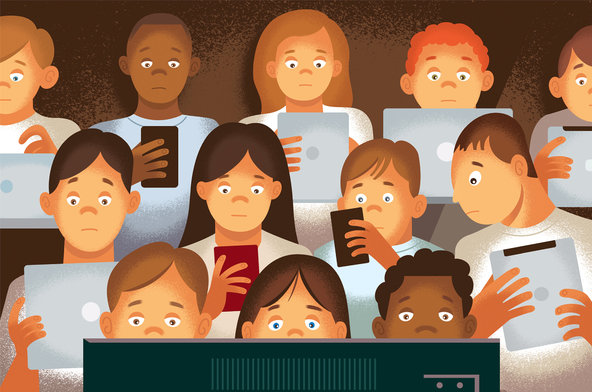
Parents are often caught in a dilemma over how much time their child should spend on computer and mobile. ‘What are they doing for so many hours?’ ‘Are they really studying or browsing the net?’ ‘What are they browsing?’ These and many more questions arise in your mind when you see your child shifting from one screen to another throughout the day. With the Corona pandemic and class room teaching shifting to virtual mode as well as children’s play time being taken away, the worries and apprehensions have multiplied. Neither can you check on your child all the time nor can you leave them to their devices in an uncontrolled manner. So how do you ensure that your child is not watching what is not age appropriate? How do you broach the subject in a manner that is unobtrusive?
The Internet can be wonderful for kids. They can use it to research school reports, communicate with teachers and other kids, and play interactive games. But online access also comes with risks, like inappropriate content, cyber bullying and online predators.
Kids’ online time can be monitored by parents and guidelines can be set. If you set rules at a young age it becomes easy to follow them even as they grow older. So start early.
Basic guidelines for parental supervision:
- Spend time online together to teach your kids appropriate online behavior.
- Keep the computer in a common area where you can watch and monitor its use, not in individual bedrooms. Monitor any time spent on smartphones or tablets.
- Bookmark kids’ favorite sites for easy access.
The Internet and Teens
As kids get older, it gets a little trickier to monitor their time spent online. They may carry a smartphone with them at all times. They probably want — and need — some privacy. This is healthy and normal, as they’re becoming more independent from their parents. The Internet can provide a safe “virtual” environment for exploring some newfound freedom if precautions are taken. However seeing inappropriate content at a young age can leave children feeling confused and unable to process what they have seen or experienced.
If your child does stumble across something inappropriate online, there are a few things that you can do to deal with it:
Establish whether if they stumbled onto the content accidentally or were simply curious and went looking for it. If it an accident, reassure them that is not a bad thing and show understanding.
- If they went looking for it, have an honest conversation about why they felt the need to, to understand and help them take a more critical view of their actions.
- Stay calm and discuss what they have seen and how it has made them feel to assess what emotional support they may need.
- If they can’t talk to you, you could take the help of professional counselors with whom they can talk about what they may be feeling.
- Review settings and control on the platforms they use to ensure that these are set to the right levels.
My child has seen inappropriate contents. What do I do?
If your child has accidentally come across pornography or actively sought it out by searching for it, it is only natural that questions about what they have seen is going to eat you up. Best way to deal with it is to talk it out.
- Have an age appropriate conversation and explain that there are some things online that are for adults only and if they see something that upsets them, they should always come and tell you.
- It may be a good time to help your child think critically about the images they see online and offline.
- Try and give them coping strategies to help them deal with any online content that they are uncomfortable with like closing the laptop lid or turning off the screen.
- Reassure them that they can always come to you if they feel they have seen something online that has worried them.
- Set your expectations. Tell them that you expect them to be forth right and honest. If they are confident that you are empathetic and won’t judge them then they will not want to lie to you.
- Appreciate them for telling the truth.
- Be prepared that they may have questions about sex and relationships. Keep age appropriate answers ready.
Block Inappropriate content in anticipation
- Make sure the devices are used in a shared room, like living room.
- Limit the chances of exposure to inappropriate content by setting up filters and parental controls on devices – i.e. filters on your home internet, and YouTube, Restricted Mode and Google Safe Search.